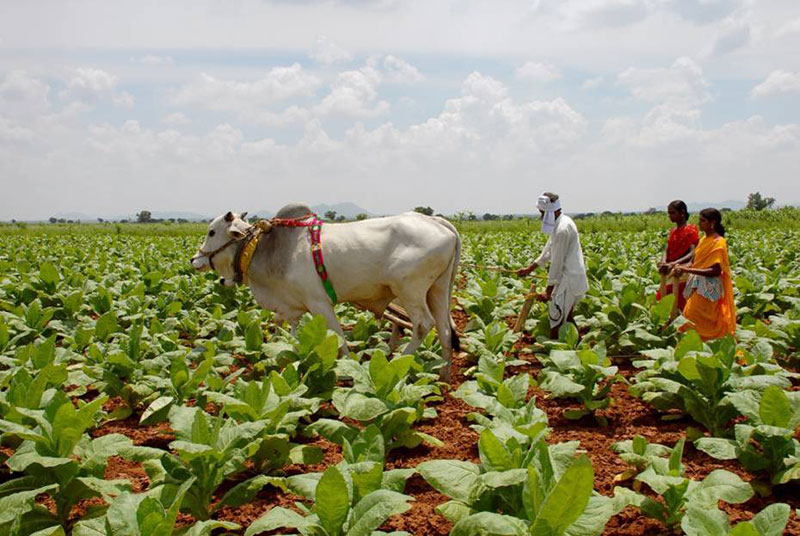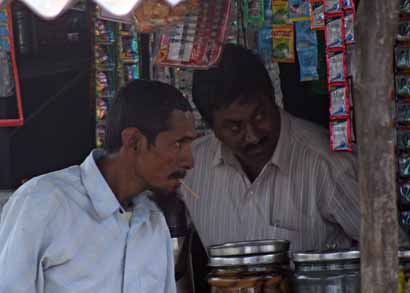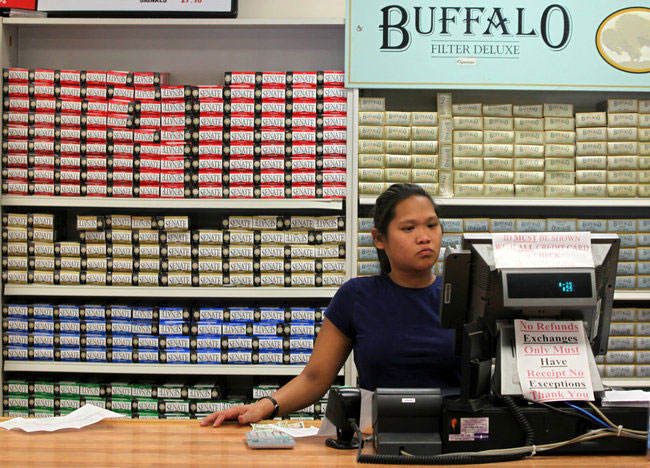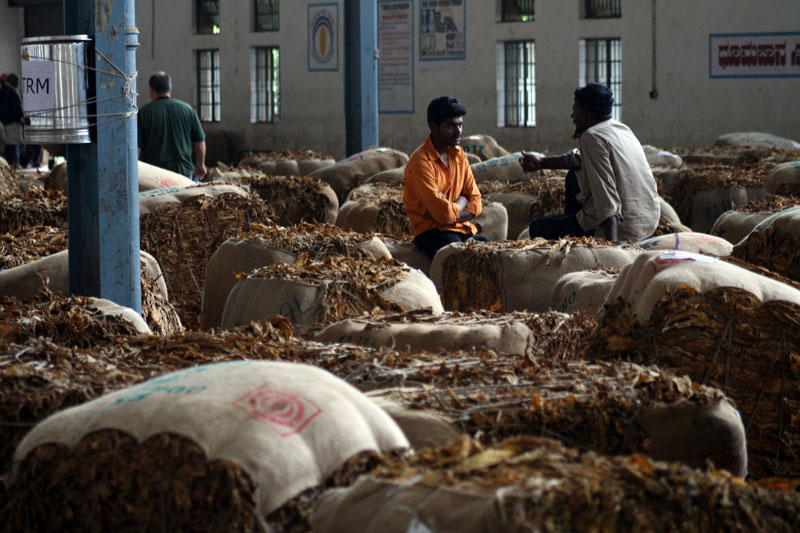The Indian Ministry of Health and Family Welfare has released new images to be included as graphic health warnings on tobacco products starting September 1.
According to a News18.com story relayed by the TMA, last week, the Supreme Court said that tobacco products would continue to carry graphic warnings covering 85 percent of the packaging space.
The government apparently released two separate set of images, the first of which will be used on tobacco products for 12 months beginning September 1, with the second to be used subsequently.
‘All tobacco products manufactured or imported or packaged on or after 1st September 2018 shall display Image-1 and those manufactured or imported or packaged on or after 1st September 2019 shall display Image-2,’ the ministry said in a statement.
‘Any person engaged directly or indirectly in the production, supply, import or distribution of cigarettes or any tobacco products shall ensure that all tobacco product packages shall have the specified health warnings exactly as prescribed.’
Violation of the provision is a punishable offence with imprisonment or fine as prescribed in Section 20 of the Cigarettes and Other Tobacco Products (Prohibition of Advertisement and Regulation of Trade and Commerce, Production, Supply and Distribution) Act, 2003.
Tag: India

New warnings in India

'Brief' auction 'disruption'
After a ‘brief disruption’ last week, flue-cured tobacco auctions had resumed in Andhra Pradesh, India, according to a story in the Hindu Times relayed by the TMA.
It was not stated how long the brief disruption lasted nor what had cause it.
It could, for instance, have been down to a technical problem, but, earlier in the year, growers, worried at the slow pace of sales, called on the Chief Minister to hold a meeting with traders.
And the disruption could have been about prices, because that has happened before. Overall, prices are said to be two percent above what they were last year, while prices in the West Godavari district are down.
According to Tobacco Board figures, growers have this year sold 85 million kg of flue-cured at an average price of Rs134.66 (US$1.96) per kg.
At the same point of last year’s sales, growers had sold 95 million kg at an average price of Rs132.00 (US$ 1.92) per kg.
According to the Times, high-grade leaf produced in the northern light soils region of West Godavari is currently being sold at an average price of Rs149 per kg (US$ 2.17) compared with Rs151 (US$ 2.20) per kg last year, while low-grade leaf is being sold below Rs80 (US$ 1.17) per kg.
Flue-cured deliveries are expected to reach 127 million kg, lower than the authorized crop size of 136 million kg.
Auctions are expected to end in September.
Shifting out of tobacco
About 15 percent of the land previously under tobacco in India has been switched to growing other crops during the past three years, according to a story in the Times of India.
This switch has been brought about as a result of the Government’s crop diversification program (CDP).
The Times reported that tobacco was grown on about 450,000 ha in 15 states – about 0.3 percent of the country’s arable land – and that the agriculture ministry had reported that 67,000 ha had been switched to pulses and vegetables.
The Times, citing the ministry, reported that the switch out of tobacco had occurred in nine states and had been ‘led’ by Andhra Pradesh.
Andhra Pradesh and Karnataka are the states that produce flue-cured tobacco for export. Between them, according to the Times report, they produce just over 70 percent of India’s tobacco.
The ministry said that tobacco was a remunerative crop with a low incidence of pests and disease, and that it was therefore a preferred crop. However, growers had been motivated to make the switch with campaigns highlighting the harmful effects of tobacco and by convincing them of the long-term benefits of alternative crops.
According to the Rajahmundry-based Central Tobacco Research Institute, studies have shown that no single crop is as remunerative as tobacco is. However, it says that a remunerative cropping system rather than a sole crop can be a viable alternative to a sole tobacco crop.
New purulent warnings
India’s Supreme Court yesterday declined to stay the central Government’s new tobacco-packaging rules that require an increase in the size of pictorial health warnings from 40 percent to 85 percent from September 1, according to a story by Bhadra Sinha for the Hindustan Times.
The Cigarettes and other Tobacco Products (Packaging and Labelling) Second Amendment Rules, 2018, require the rotation of graphics and the replacement of current images. The image of a person’s throat with a hole in it, for instance, is to be replaced with more “gruesome pictures of a person’s lips with diseased and purulent growth”.
And in line with this change, the written warning, ‘Smoking causes throat cancer’ is to be replaced with ‘Smoking causes painful death’ and Tobacco causes cancer’, in white upper-case letters against a red background.
The rules require also that packs carry a quit number through which tobacco-product users can connect with online assistance.
Andhra prices tumble
Tobacco growers in the Indian state of Andhra Pradesh had sold 63.51 million kg of leaf during the 98 days of marketing since auctions began in early March, according to a story in the latest issue of the BBM Bommidala Group newsletter.
The average price was said to have been down to Rs137.38, but there was no mention of what the comparison average price was.
However, a previous report, after 60 days of marketing and with 24.77 million kg of tobacco sold, put the average price at Rs163.00 per kg; so the average price fell by nearly 16 percent during the period from the 60-day to the 98-day stage of the marketing season.
In addition, a newsletter story from last year had it that after about 40 days of marketing, 21.57 million kg of tobacco had been sold for an average price of Rs145.53 a kg; so it would seem that prices this year are running about 5-6 percent below those of the previous year.
It is often said that prices are dependent on the quality of the leaf on offer, but this seems unlikely to the case here. The report said that a major share of the 63.51 million kg that had been auctioned, 34.36 million kg, comprised bright grades that fetched an average of Rs154.00 a kg.
Meanwhile, 18.39 million kg of medium-grade leaf had traded for an average price of Rs133.18 a kg, and 10.8 million kg of low-grade leaf had sold for an average price of Rs91.19 a kg.
In fact, as is usually the case, prices seem to be being driven by volume demand, or lack of it. By the 98-day point of last year’s sales, double the 63.51 million kg of this year’s sales had been auctioned.
Earlier this year, growers, worried at the slow pace of sales, called on the Chief Minister to hold a meeting with traders.
Growers’ concerns will have been heightened by the fact that the Andhra crop on offer is not a big one. The authorised crop size was 136 million kg, but the production estimate puts it at about 125 million kg.
A matter of choice
In many parts of the world, it would be uncontroversial to say that women have the right to smoke, though this right often comes burdened with the unspoken idea that really they shouldn’t. No doubt this partly explains why smoking rates among men are higher than they are among women even in liberal societies.
In India, according to a piece by Rhea Almeida in Feminism in India, the pressures that women alone are subjected to are disguised under the claim that smoking – and much else that is enjoyable – is against India’s moral fiber and traditional customs of ‘dutifulness’.
Almeida is aware that she is standing on shaky ground in respect of smoking and she makes clear that she is not advocating that women should smoke, only that they should have the right to choose whether to smoke.
‘Smoking kills, this we know,’ she writes. ‘But for several women in urban India, not smoking isn’t always an informed, health-conscious choice. Often it’s not a choice at all, it’s a social construct. And for many who do choose to smoke, it’s a struggle or a secret you’re forced to keep.’
Almeida, who works for women’s economic development in India, closes here lengthy piece by saying that the trend of curbing a woman’s freedom exists across India in many colours and shapes.
‘While the act of smoking itself is not a liberator or emancipator for women, despite what big tobacco would have us believe, the freedom of choice to smoke or not to smoke, is,’ she said.
IQOS rumored for India
Philip Morris International is planning to launch IQOS in India, according to a story by Aditya Kalra for Reuters citing ‘four sources familiar with the matter’.
A government source was quoted as saying the government would keep an open mind if PMI approached it to discuss a device that helped people quit smoking, but added that such devices, including electronic cigarettes, could be banned if found to be harmful.
A PM spokesman was quoted as saying that the company did not comment on its plans, but that it was committed to working to replace cigarettes with scientifically-substantiated smoke-free products.
But Reuters said that the company seemed to have started building a public case for IQOS in India.
On World No Tobacco Day, R. Venkatesh, PM’s top corporate affairs executive in India, wrote a column for India’s Economic Times newspaper calling for ‘effective regulations’ for alternative smoking devices.
‘With alternatives to cigarettes available and countries already delivering on their smoke-free ambitions, the incentive is there for lawmakers to support Indian smokers – who deserve a better option,’ Venkatesh wrote.
High prices at slow sales
Flue-cured tobacco auctions that began in the Indian state of Andhra Pradesh in early March have yet to gather pace, according to a story in the latest issue of the BBM Bommidala Group newsletter.
After 60 days of marketing 24.77 million kg of tobacco had been sold at an average price of Rs163 per kg.
The story indicated that by the same stage of last year’s auctions, double that quantity of tobacco had been sold, though there was no mention of what the average price had been.
However, a newsletter story from last year had it that after about 40 days of marketing, 21.57 million kg of tobacco had been sold for an average price of Rs145.53 a kg; so it would seem that prices this year are running about 12 percent above those of the previous year.
The increase in price has occurred possibly because this year 16 million kg of the tobacco sold so far is said to be bright leaf grades.
Despite the higher prices, growers are apparently worried at the slow pace of sales and are calling on the Chief Minister to hold a meeting with traders.
Growers’ concerns will have been heightened by the fact that the crop on offer is not a big one. The authorised crop size was 136 million kg, but the production estimate puts it at about 125 million kg.
Putting an end to ENDS
India’s Ministry of Health and Family Welfare has proposed banning electronic nicotine delivery systems (ENDS), including electronic cigarettes, according to a story in the most recent issue of the BBM Bommidala Group newsletter.
The Ministry says that such a ban would be a matter of public interest.
It recently informed the Delhi High Court that e-cigarettes contained nicotine and that they could be a gateway product that led young people to try combustible cigarettes. Therefore, the government was looking to ban the devices altogether.
The High Court took up the issue after Seema Sehgal, described as a homemaker, filed a petition asking the government to formulate guidelines for the sale, production and supply of the devices.
Six Indian states have prohibited the manufacture and marketing of vaping products.
Prices increased in India
The average price paid to growers for flue-cured tobacco after 25 days of sales on auction floors in the Indian state of Andhra Pradesh was increased by about 1.5 percent on that at the comparable stage of the 2017 sales season, according to a story in the latest edition of the BBM Bommidala Group newsletter.
After the sale of 2.97 million kg of flue-cured tobacco this year, the average price stood at Rs157.31 per kg, up from Rs154.93 per kg last year following the sale of a similar quantity.
Sales which began on March 8, have been held at centers within the Southern Light Soil and Southern Black Soil areas.
They are due to open at the state’s East- and West-Godavari platforms tomorrow.
The Tobacco Board of India increased the authorized Andhra Pradesh crop size to 136 million kg for the 2017-18 season, but production is estimated at 125 million kg.
Meanwhile, flue-cured tobacco auctions are winding down in the state of Karnataka, where 104.79 million kg had been sold after 162 days of sales that started on September 8.
The Board authorized a crop of 99 million kg, but it is expected that it will end up at just over 106 million kg.
The newsletter said that the average price in Karnataka, at Rs139.67 per kg, was up on that of the previous season, but it did not mention by how much.







